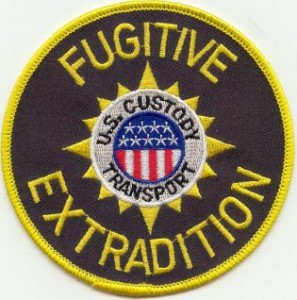 Every State of the United States has legal authority regarding people present within its boundaries. A State does not have authority over a person present in another State. For example: If a person is wanted for a crime committed in Illinois is found in Florida, an arrest can only legally be made by Florida law enforcement personnel.
Every State of the United States has legal authority regarding people present within its boundaries. A State does not have authority over a person present in another State. For example: If a person is wanted for a crime committed in Illinois is found in Florida, an arrest can only legally be made by Florida law enforcement personnel.
To legally arrest a person wanted for criminal activity who is found in a state other than where the crime was committed and return that individual to the state charging the crime, there must be cooperation between the two states. There is a two-step legal process for this to happen. The first step is the issuance of an interstate arrest warrant. The second step is extradition.
The Arrest Warrant Issued
A judge commanding law enforcement officials to bring a wanted person before the court to answer to criminal charges issues the arrest warrant.
The Fourth Amendment to the US Constitution commands the following conditions exist for an arrest warrant to issue:
“The right of the people to be secure in their persons … against unreasonable searches and seizures, shall not be violated, and no Warrants shall issue, but upon probable cause, supported by Oath or affirmation, and particularly describing the … the person … to be seized.”
If the crime is serious enough and the prosecuting authority is interested in finding the person and willing to bear the expenses of extradition, then an interstate warrant will be in effect nationally.

The Law of Interstate Rendition, Erroneously Referred to As Interstate Extradition
International Extradition Compared to Interstate “Rendition”
Technically the term extradition applies to a process of returning a fugitive from one country to another. This process is governed by treaty agreements between the two countries. The process between two states is one of rendering the fugitive by one state to another, or “interstate rendition”. The rendition process is governed by the US Constitution, federal statute and state statues. International extradition procedure differs significantly from interstate rendition. Despite the differences, the procedure between the states is commonly referred to as “extradition”.
The Extradition Clause of the United States Constitution
Extradition is the official process by which a state asks for and acquires from another state the custody of a suspected or convicted criminal. The manner in which extradition takes place among the states is governed by the United States Constitution, Federal statute and state law.
Each state of the United States is considered to be sovereign over its territory and when the Constitution was written there was concern about criminals being able to safely flee from one state to another to avoid prosecution. In response to this concern, Article IV, Section II, Clause 2 was included. This is known as the Extradition Clause and reads as follows:
“A Person charged in any State with Treason, Felony, or other Crime, who shall flee from Justice, and be found in another State, shall on demand of the executive Authority of the State from which he fled, be delivered up, to be removed to the State having Jurisdiction of the Crime.”
The Supreme Court of the United States has held that the Extradition Clause applies to felonies, misdemeanors and even to petty offenses. It has further held that in the event a state chooses not to surrender a wanted individual, a federal court may order such surrender to the demanding state, pursuant to the Extradition Clause.1
Federal Statutes Governing Extradition
Congress has passed laws pursuant to the Extradition Clause to further define the circumstances of extradition between the states. In order for a person to be extradited interstate, 18 U.S.C. § 3182 requires:
- An executive authority demand to the state to which a fugitive from justice has fled.
- The requesting executive must produce a copy of an indictment found or an affidavit made before a magistrate of any State or Territory.
- Such document must charge the fugitive demanded with having committed treason, felony, or other crime.
- Such document must be certified as authentic by the governor or chief magistrate of the state or territory from whence the person so charged has fled.
- The executive receiving the request must then cause the fugitive to be arrested and secured, and notify the requesting executive authority or agent to receive the fugitive.
- An agent of the executive of the State demanding extradition must appear to receive the prisoner, which must occur within thirty days from time of arrest or the prisoner may be released.
- Cases of kidnapping by a parent to another state automatically involve the US Marshall.
The Uniform Criminal Extradition Act
The UCEA2 has been adopted by 48 of the 50 states, the only exceptions being South Carolina and Missouri. The Act sets forth the process by which a state may request surrender of a wanted individual and the manner in which that individual is surrendered. While there are some variances among the Act as adopted by the states, the principal requirements for extradition are as follows:
- A valid arrest warrant issued by the demanding state
- A request from the Executive Authority of the demanding state (typically the Governor)
- A judicial hearing in the state having custody of the wanted person
- A waiver of extradition by the wanted person or a judicial finding that the Governor’s request follows all legal requirements if extradition is not waived
- Custody taken by the demanding state of the wanted person within 30 days
- If the demanding state does not take custody within 30 days, the prisoner may be discharged.
______________________________________________________________________________
1This was not always the case. In Kentucky v. Dennison – 65 U.S. 66 (1860) the Supreme Court said the federal government was without authority to compel the governor of a sovereign state to surrender a prisoner to another state. Times had changed by 1987, when the Supreme Court, in deciding Puerto Rico v. Branstad, 483 U.S. 219, stated: “the Dennison holding as to the federal courts’ authority to enforce the Extradition Clause rested on a fundamental premise — that the States and the Federal Government in all circumstances must be viewed as coequal sovereigns — which is not representative of current law.” A demonstration of how the Supreme Court has functionally centralized power in Washington through its decisions.
2Here is a link to the UCEA as adopted by the State of Illinois.






[…] next part of Section 2 deals with the return of criminal fugitives or extradition: “A Person charged in any State with Treason, Felony, or other Crime, who shall flee from […]